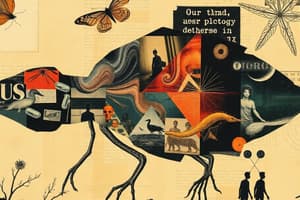Podcast
Questions and Answers
What is the primary function of nutrition in living organisms?
What is the primary function of nutrition in living organisms?
- To acquire and utilize energy-rich molecules to fuel life processes (correct)
- To break down ATP into glucose
- To convert glucose into energy-rich molecules
- To extract oxygen from the environment
Which process involves the extraction of oxygen from the environment?
Which process involves the extraction of oxygen from the environment?
- Reproduction
- Respiration (correct)
- Excretion
- Circulation
In which process do cells break down glucose to release energy?
In which process do cells break down glucose to release energy?
- Nutrition
- Reproduction
- Circulation
- Respiration (correct)
What are the two primary methods of nutrition mentioned in the text?
What are the two primary methods of nutrition mentioned in the text?
What is the primary process of removing waste products such as urea and uric acid in humans?
What is the primary process of removing waste products such as urea and uric acid in humans?
Which type of respiration do humans primarily rely on?
Which type of respiration do humans primarily rely on?
In what way do some microorganisms and animals in oxygen-depleted environments rely on respiration?
In what way do some microorganisms and animals in oxygen-depleted environments rely on respiration?
What is the process of creating and passing on genetic information to offspring known as?
What is the process of creating and passing on genetic information to offspring known as?
How do some animals, such as birds and reptiles, excrete waste products?
How do some animals, such as birds and reptiles, excrete waste products?
What is the primary organ responsible for circulation in humans?
What is the primary organ responsible for circulation in humans?
Study Notes
Title: Unpacking Life Processes: Nutrition, Respiration, Excretion, Circulation, and Reproduction
Introduction
Life processes are the essential functions that living organisms carry out to sustain themselves, grow, and reproduce. In this article, we'll delve into five fundamental life processes: nutrition, respiration, excretion, circulation, and reproduction. Each process plays a vital role in maintaining the health and well-being of different organisms, from the tiniest unicellular beings to the most complex multicellular creatures.
Nutrition
Nutrition is the process of acquiring and utilizing energy-rich molecules, primarily carbohydrates, fats, and proteins, to fuel the various life processes. Organisms obtain nutrients from their environment through consuming other organisms (feeding) or absorbing nutrients from their surroundings (as in plants).
There are two primary methods of nutrition: heterotrophic (using other organisms as a source of nutrients) and autotrophic (producing or synthesizing their own nutrients). For example, humans are heterotrophs, while plants and some bacteria are autotrophs.
Respiration
Respiration is the process by which living organisms extract oxygen from their environment and convert it into energy-rich molecules, such as adenosine triphosphate (ATP), which fuel various life processes. Respiration occurs in cells through cellular respiration, a series of biochemical reactions that break down glucose (a sugar) and release energy.
There are two main types of respiration: aerobic (with oxygen) and anaerobic (without oxygen). Humans primarily rely on aerobic respiration, whereas some microorganisms and animals in oxygen-depleted environments rely on anaerobic respiration.
Excretion
Excretion is the process of removing wastes and unwanted materials from the body, helping to maintain internal homeostasis. Different organisms have evolved various methods of excretion, depending on their size and the nature of their waste products.
In humans, kidneys filter blood to remove waste products such as urea and uric acid, which are then excreted through the urinary system. Some animals, such as birds and reptiles, excrete waste through the cloaca, a shared opening for the urinary, digestive, and reproductive systems.
Circulation
Circulation is the process by which blood is circulated throughout the body, delivering oxygen and nutrients to cells and tissues and removing waste products. In animals, circulation involves the pumping of blood through a system of arteries, veins, and capillaries. Humans have a closed circulatory system, where blood remains within the circulatory system, while some invertebrates have open circulatory systems, where body fluids circulate outside of the cells.
Circulation plays a vital role in maintaining body temperature, delivering hormones to target tissues, and helping to prevent the spread of infection. The heart is the primary organ responsible for circulation in humans and some other animals.
Reproduction
Reproduction is the process of creating and passing on genetic information to offspring. Different organisms reproduce in various ways, depending on their size, lifestyle, and environmental conditions.
Some organisms reproduce sexually, relying on the combination of genetic information from two parents, while others reproduce asexually, without combining genetic material from a second parent. Humans rely on sexual reproduction, while some bacteria and fungi reproduce asexually.
Conclusion
Life processes are the fundamental building blocks of life. Each process plays a vital role in maintaining the health and well-being of living organisms. Understanding the mechanisms behind these processes can provide us with valuable insights into the complex interplay of living systems and help us better understand our own biology.
By exploring the intricate relationships between nutrition, respiration, excretion, circulation, and reproduction, we can better appreciate the marvels of life and the complexities of our own existence. Next time you take a breath, savor a meal, or witness a new life emerge, remember the fascinating life processes that make these experiences possible.
Studying That Suits You
Use AI to generate personalized quizzes and flashcards to suit your learning preferences.
Description
Test your knowledge about the fundamental life processes - nutrition, respiration, excretion, circulation, and reproduction. Explore the significance of each process in sustaining living organisms and understand the mechanisms behind them.




